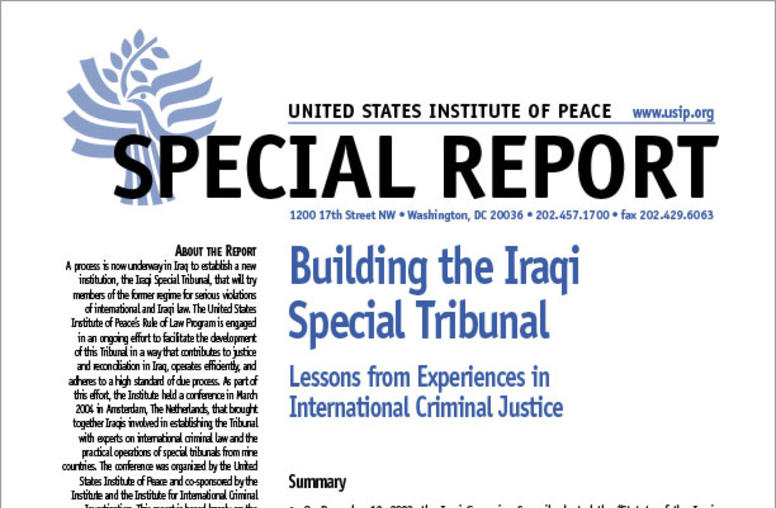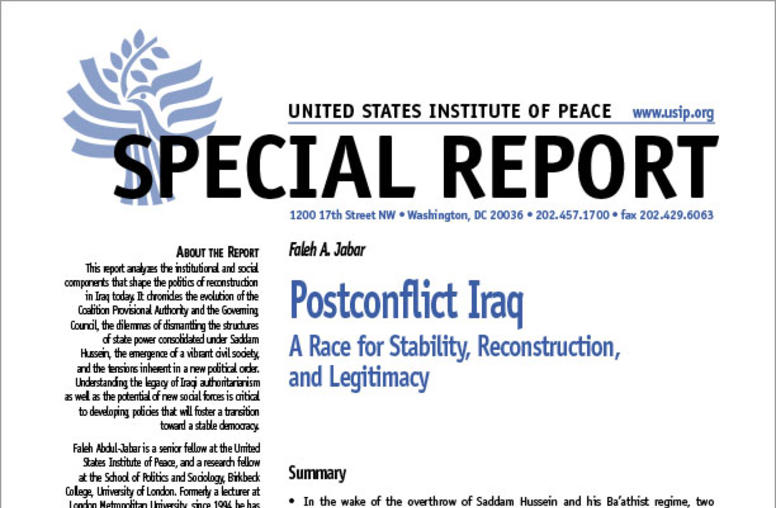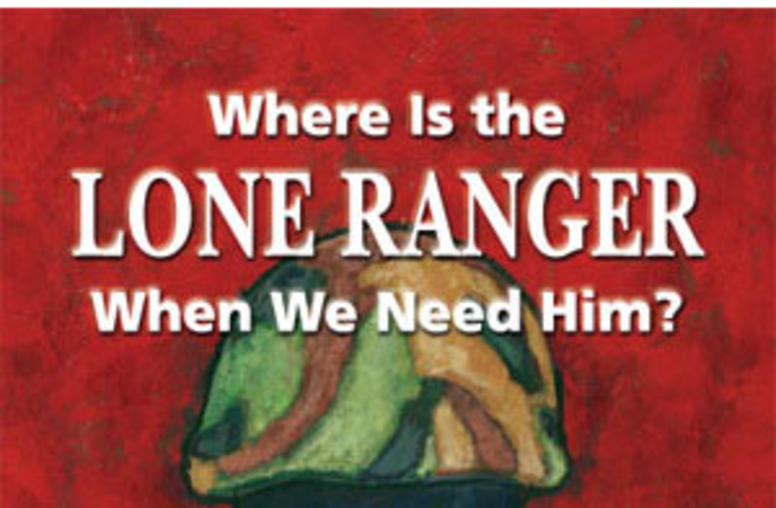Publications
Articles, publications, books, tools and multimedia features from the U.S. Institute of Peace provide the latest news, analysis, research findings, practitioner guides and reports, all related to the conflict zones and issues that are at the center of the Institute’s work to prevent and reduce violent conflict.

Building the Iraqi Special Tribunal: Lessons from Experiences in International Criminal Justice
A process is now underway in Iraq to establish a new institution, the Iraqi Special Tribunal, that will try members of the former regime for serious violations of international and Iraqi law. The United States Institute of Peace’s Rule of Law Program is engaged in an ongoing effort to facilitate the development of this Tribunal in a way that contributes to justice and reconciliation in Iraq, operates efficiently, and adheres to a high standard of due process.
Building the Iraqi Special Tribunal: Lessons from Experiences in International Criminal Justice (Arabic Edition)
Summary On December 10, 2003, the Iraqi Governing Council adopted the "Statute of the Iraqi Special Tribunal," providing the legal foundation and laying out the jurisdiction and basic structure for the Tribunal that will be responsible for prosecuting acts of genocide, crimes against humanity, and war crimes committed in Iraq between 1968 and 2003.

Post-Conflict Iraq: A Race for Stability, Reconstruction, and Legitimacy
This report analyzes the institutional and social components that shape the politics of reconstruction in Iraq today. It chronicles the evolution of the Coalition Provisional Authority and the Governing Council, the dilemmas of dismantling the structures of state power consolidated under Saddam Hussein, the emergence of a vibrant civil society, and the tensions inherent in a new political order.
Postconflict Iraq: A Race for Stability, Reconstruction, and Legitimacy (Arabic Edition)
Summary In the wake of the overthrow of Saddam Hussein and his Ba'athist regime, two main tasks have confronted the Americans and Iraqis who now hold power. One is to stabilize the country; the other is to liberalize it economically, politically, and socially. Although the requirements of stabilization have so far overshadowed progress toward liberalization, significant steps have been taken in transitioning from totalitarianism to free market democracy. Much more, however, remains to...
The Iraqi Shi'i Community: Between Sistani, Muqtada, the IGC, and the CPA
Congressional Testimony by Amatzia Baram, Senior Fellow, U.S. Institute of Peace.
Mosque and State: Religion and Politics in Iraq
A Special Discussion on Capitol Hill Sponsored by The Faith and Politics Institute and the United States Institute of Peace.
Iraq and Its Neighbors: A Regional Architecture Is Needed
Regime change in Iraq has affected its neighbors, and these neighbors in turn affect the reconstruction process in Iraq. In the past regional dynamics have too often led to strife and war. How can these dynamics be channeled in more positive directions: towards development, economic cooperation, democracy, and security for all?
Managing Iraq's Oil Revenues
Ensuring that the Iraqi people become the primary beneficiaries of the country's oil will be critical not only to the credibility of efforts by the coalition but also to Iraq's future democracy and unity.

Where is the Lone Ranger When We Need Him?
A penetrating study of U.S. policy on peace operations, examining the challenges of establishing sustainable security in postconflict environments in places like the Balkans, Afghanistan, and Iraq. Robert Perito chronicles the history of American conceptions and misconceptions regarding peacekeeping forces.
The Role of Religion in Iraqi Politics
Iraq seems to be experiencing a religious revival and religious leaders, particularly Shiite leaders, exert increasing political influence.